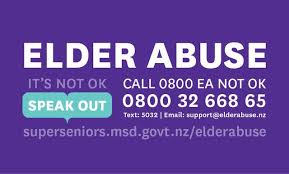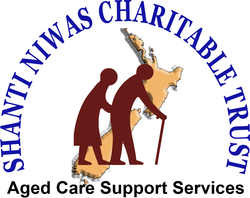Elder Abuse and Neglect is a single or repeated act, or lack of appropriate action, occurring within any relationship where there is an expectation of trust, which causes harm or distress to an older person.
Definition adopted from WHO Toronto Declaration on the Global Prevention of Elder Abuse, 2002
Types of Abuse:
- Psychological Abuse
Behaviour causing mental anguish, stress or fear.
For example:
- ridicule or threats
- harassment or humiliation
- preventing choice or decision-making
- withholding affection.
2. Financial Abuse
Illegal or improper use of money, property or other assets.
For example:
- unauthorised taking of money or possessions
- misuse of power of attorney
- failure to repay loans
- use of home and/or utilities without contributing to costs
- scams that rely on establishing a relationship with the older person with the intention of exploiting their savings and/or assets, e.g. romance scams.
3. Physical Abuse
Infliction of pain, injury or use of force.
For example:
- hitting, pushing, rough handling •over-medication
- inappropriate use of restraints or confinement.
4. Neglect
Not providing for physical, emotional or social needs.
For example:
- inadequate food, clothing, shelter.
- lack of social contact, support.
- health needs not attended to.
5. Sexual Abuse
Non-consensual sexual acts or exploitive behaviours.
For example:
- inappropriate touching
- sexual acts with someone unable to give consent.
6. Institutional Abuse
A policy or accepted practice within an organisation that disregards a person’s rights or causes harm.
For example:
- lack of respect for a person’s culture or customs
- inappropriate rationing of continence products
- inflexible routines e.g. breakfast at 8 am in the dining room.
What are the warning signs?
Some of the following signs which MAY indicate an older person is being abused:
- unexplained behaviour, sleeping or eating habits
- withdrawal and/or edginess
- fear of a particular person
- confusion
- unexplained injuries
- drowsiness (due to overmedication)
- recoiling from touch
- unusual withdrawals from bank accounts
- unpaid bills, lack of money for necessities.

Protecting yourself against elder abuse
• Contact our Social Workers.
• Keep in touch with family and friends and avoid becoming isolated
• Make sure your financial and legal affairs are in order
• If you are unhappy with the care you are receiving, whether it's in your own home or in a care facility, speak up
• Tell someone you trust and ask that person to report the abuse, neglect, or make the call yourself
• Staying physically healthy - exercise daily, eat a well-balanced diet, visit your GP and health care professionals regularly.
• Protect your future with an Enduring Power of Attorney (EPA).
Khushi
Kind Heal Unite Support Humble Inspire
SERVICES
- Social work intervention
- Confidential and free service
- Culturally Appropriate Services
- Family Group conferences/Mediation/ Micro Counselling
- Inter-agency referrals
- Support to the carers and the families of older people
- Creating awareness on Elder Abuse and Neglect in the community
ELDER ABUSE IT'S NOT OK SPEAK OUT
0800 EA NOT OK 0800 32 668 65 FOR OUR FREE AND CONFIDENTIAL SERVICE
CALL SHANTI NIWAS FOR CONFIDENTIAL SERVICE 09-6221010
Our goal is to Recognise, Prevent and Respond to Abuse & Neglect of older people in South Asian communities and to ensure their wellbeing.

